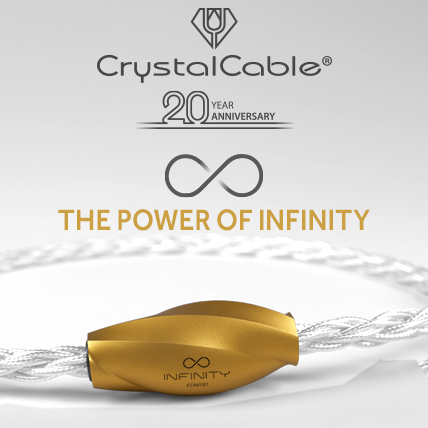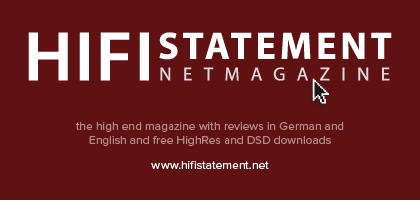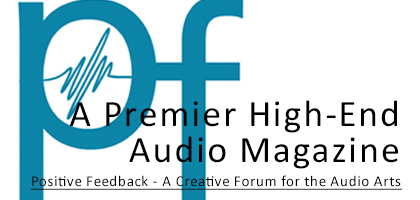No. 261 February 2026
- COVER REVIEW: TECHDAS Air Force IV ⸜ turntable » JAPAN
- RECORDING TECHNIQUE ⸜ music: 3M DIGITAL AUDIO MASTERING SYSTEM Part 2 || MUSIC » USA
- MUSIC ⸜ review: ARNE DOMNÉRUS, , Jazz At The Pawnshop, Proprius/AudioNautes Recordings MQA-CD Crystal Disc ⸜ 1977/2025 » SWEDEN / ITALY
- REVIEW: CIRCLE LABS AS100 ⸜ integrated amplifier » POLAND
- REVIEW: SHANLING EC Zero T ⸜ MQA-CD player • mobile » CHINA
- REVIEW: FEZZ AUDIO Sagita Prestige Evo & Olympia Evo Mono ⸜ linestage & power amplifier • monaural » POLAND
- MICRO REVIEW: ACOUSTIC REVIVE PS-DBLP ⸜ record clamp / stabilizer » JAPAN

|
Editorial
text by WOJCIECH PACUŁA |
 |
No 261 February 1, 2026 |
|
WHAT WILL HAPPEN? A few thoughts for 2026
TO BEGIN WITH, I SUGGEST taking a look at an excerpt from the introduction to the book Metamodernism: the Future of Theory by Jason Ananda Josephson Storm, translated by Janina Szczur:
Philosophers began writing about the linguistic turn of the 1950s and 1960s. This paved the way for at least three additional “turns” in the late 1970s and early 1980s, namely the cultural, interpretive, and historical. Then, in the late 1980s, there was the cognitive turn. In the early 1990s, researchers compiled sources on the postmodern turn. In the mid-1990s, there was yet another historical turn (or maybe the same one as before returned). Without the slightest sign of fatigue, researchers pressed on, so the late 1990s and early 2000s saw discussions about the religious turn and the bodily turn.
In turn, the last two decades have brought a breathtaking series of turns, including (more or less chronologically) the speculative turn, the visual turn, the participatory turn, the affective turn, the material turn, the transnational turn, the pragmatic turn, the sensory turn, and the historical turn (for the third time, perhaps forgetting its own history), mobility turn, temporal turn, spatial turn, reparative turn, animal or non-human turn, human turn (presumably antagonistic to the previous one) and ontological turn. Recently, researchers have also proposed pedagogical turn, exercise turn, everyday turn, and empirical turn. However, it is unclear whether any of these will catch on. At virtually the same time as I am writing this introduction, Japanese scholars Isomae Jun’ichi and Kawamura Satofumi have proposed a Levinas-inspired turn of otherness, while American theorist Mark Seltzer has begun promoting what he calls a turn of return. (source: → www.ZAKLADMAGAZYN.pl, accessed: 12/23/2025) I am quoting this passage in its entirety, not to bore you, as it is a specialized text, but to draw your attention to the fact that recently, in the humanities, we have been dealing with increasingly rapid changes. What you see above is not gibberish or nonsense, but a synthetic list by an important author of an interesting theory (metamodernism), showing how quickly points of reference become obsolete in our culture. And with them, our understanding of what is happening around us and what our role is in it. 
‖ Closer Acoustics Blocks speakers are a good example of how solutions from the early days of the audio industry are still attractive in terms of sound quality. One thing is important: rapid change. In audio, it looks a little different. It is an ultra-conservative field where technological progress is usually put in quotation marks, not only by anachrophiles, as we call vintage device enthusiasts, but also by many mainstream audiophiles. Therefore, when considering a one year perspective, any shifts are unlikely to happen. There will rather be some slow adjustments. And these will almost exclusively be adjustments based on solutions that we have known for a long time. In a new edition, better, more refined, but still comebacks. One of them seems to be the growing interest in CDs in various shades. After years of self-diversification practiced by the so-called majors, i.e., the largest record labels, something has changed in this regard. Focused on the vinyl market, where margins on records are the highest, after the “boom” in streaming, they have probably reached a point where the decline in sales cannot be stopped by pushing something that is culturally popular, sounds cool, but has little musical significance for most consumers (vinyl), or by giving access to music for a fraction of what it is worth, at the expense of the labels and artists themselves (streaming). 
‖ Until now, the CD format has been “driven” and developed by Japanese companies – that is where the MQA-CD format has its supporters. The CD seems to be the perfect combination of nostalgia and futurism. And it is incredibly convenient to use as a stationary format. This can be seen in the growing range of such players offered by manufacturers not only from China, but also from Europe. Small record labels such as Audionautes Recording, Ultra Art Recordings, and others also support this theses. And these are not usually classic “CDs,” but sophisticated versions such as SACD, Ultimate HQCD, and even Crystal Disc CD. The “mini renaissance” of interest in Super Audio Compact Discs is primarily due to Japanese publishers, who have continued to offer music in this format, but also – surprisingly – the aforementioned major labels. In the US, the driving force behind this revival was the “Atlantic 75” series, commemorating the 75th anniversary of Atlantic Records, officially launched in September 2023, with the first releases appearing in October 2023. As part of this series, we received iconic albums from the label's rich catalog, remastered by Analogue Productions. 
‖ Italian Audionautes Recordings is the first non-Japanese entity to offer MQA-CDs – pictured here is its first title encoded in this format. Interestingly, at the same time, but in Poland, Warner Music Poland released the first five titles in the “Polskie Nagrania Catalogue Selections” series. To date, both labels have almost completed their plan, permanently changing the attitude of the so-called “average consumer” towards formats that we now consider “ours,” i.e., audiophile formats. Perhaps they will stay with us for longer, thanks in part to Damian Lipiński's excellent handling of this challenge in our market. He is also behind Warner's decision to release Breakout and Niemen's albums on 200g vinyl. I find it interesting that record labels are reaching for solutions from an industry they usually ignore. Previously, it was only about “borrowing” a term and “selling” it through the promotion departments of Empik, Amazon, Allegro, etc. What is interesting is that they trusted audiophile ideas and people associated with this industry – Analogue Productions in the US and Damian in Poland. This would have been unthinkable in the past. So perhaps the money spent by the perfectionist industry, plus the role of “arbiters” played by its representatives, has begun to be important in a shrinking market. And that's good. We'll see if these were one-off actions or an opening up to new ideas. The question of “one-off” and “permanent” also arises in the context of the High End Show, which this year is to be held in Austria for the first time, rather than in Germany. I talked about this with many people, and I found the opinion of one of the “insiders” most interesting, who claims that this is an experiment doomed to failure. As it turns out, the move from Munich to Vienna was caused by announcements by the owner of the M.O.C. complex that it would be demolished and a completely new one built. These turned out to be unfounded, and the halls still host various types of exhibitions. The expert sees it this way: High End Society, the owner of the show, will organize it in Austria this year, and then do everything it can to return to the Bavarian capital. He argues that the largest distributors from Germany, who provided the financial basis for the event, will not go to Vienna, nor will German audiophiles. And the Eastern Reich (Österreich) does not really have its own audio scene; it is rather an outpost of German companies. Therefore, the event organizer will want to return even at the cost of substantial penalties that he will have to pay. What will happen? We'll see, but there's something to it. By the way, Audio Video Show, our domestic event, may turn out to be the largest audiophile exhibition in the world this year. 
‖ A trend that began in 2023 and continued in 2024 and 2025 was SACDs offered by large corporations – in our country, this was the excellent “Polskie Nagrania Catalogue Selections” series. |
The situation with the EISA awards is also interesting. Behind the scenes, there is talk that Paul Miller, editor-in-chief of Hi-Fi News & Record Review magazine and head of the organization, is set to step down this year. These are just rumors, but rumors from a reliable source. He will probably want the ideological line of the organization responsible for the world's most famous audiophile awards, which he started, to remain unchanged. One way to do this could be to move the event where the awards are presented to... Warsaw. That is, to the Audio Video Show. Impossible? I also think it's unlikely, but it's worth knowing that such rumors are circulating. All this shows that Poland is on the rise. We can see it in various areas, such as tourist and culinary recommendations appearing all over the world, but also in audio. We are still playing above our weight class; we don't have the so-called “old money,” but we make up for it with creativity, hard work, and ingenuity. Just open any of the “big five” audio magazines (Stereophile, The Absolute Sound, Hi-Fi News & Record Review, Hi-Fi+, and Stereo Sound) to see tests, reviews, advertisements, interviews, reports, news, etc. related to brands from the Vistula River. I think this trend will continue to grow. Similarly, music content aggregators (streaming services) strive to “optimize” costs. That is, to pay artists and publishers even less. Let's not kid ourselves – big tech companies rule the roost, supported by the aggressive anti-EU policy of Donald Trump's administration, and they will stop at nothing. Including promoting music created by AI. For now, they are releasing “trial balloons,” but I believe that regardless of the results of this research, the decision has already been made. “Artificial” is simply cheap and has no requirements. Therefore, returning to the topic of SACD discs from major labels, it is worth creating an alternative circuit to the activities of streaming platforms and their owners. And relying on the experience gathered by enthusiasts is an excellent idea. I am convinced that few people on the boards of major labels have any idea what this is, but there is clearly an understanding that it is valuable. Moreover, it is a value that can be sold and profited from. So if publishers have a self-preservation instinct, they will return to traditional sales channels and physical media, with CDs being a key one. It may be helped with a cultural shift from the 1990s trend to the new millennium. You know how it is—fashion trends come back every twenty years or so, and recently even faster. So we can assume that we are entering the era of the 2000s. (Y2Y). The world is crazy about The Sims, the wars started by George W. Bush, the effects of which we are feeling and will continue to feel for years to come, Bridget Jones's Diary, and the launch of the iPod. The latter event marks the beginning of the third revolution in the world of music, after the LP and the compact disc. 
‖ A few second-hand CDs, costing 10-20 zlotys each, which I recently bought at Paul's Boutique Record Store in Krakow, in the corner where they keep “scrap.” In Poland, on the other hand, it was the first editions of Big Brother and Idol, but also the death of John Paul II. It was also Kayah's performance on MTV, as part of the MTV Unplugged series. The latter event would be the conclusion of the pioneering work of many people who set up record labels after the fall of the Polish People's Republic (Pomaton, Zig Zac, MJM Music) and independent recording studios, led by Izabelin Studio. All this happened in the 1990s, but the fruits of these efforts came a decade later. The closing of the decade ending the 20th century (for now) seems to be confirmed by Tomasz Lada's excellent book entitled Wszystko jak leci (Everything as it goes), whose subtitle, Polski pop 1990-2000 (Polish pop music 1990-2000), says it all. Prepared by Czarne, a publishing house with a unique intuition for authors (see the 2025 Nobel Prize in Literature for László Krasznahorkai, represented by people from Wołowiec), not necessarily focused on musical themes, summarizing the 1990s and takes us into the next century. And this is a century whose first decade was dominated by CDs. The summaries tell us that we are already somewhere further along. All this also suggests that, as it seems, in 2026 we will see even more SACD and CD (and MQA-CD) players than before. However, with another trend in audio, tubes, things may be different. In this issue of High Fidelity, you can read a review of the Circe Labs AS100 integrated amplifier. It is the first device from this Krakow-based manufacturer that does not use tubes. It is followed by the powerful M500 power amplifier, also with a semiconductor input stage. This is an important change, even a declaration. 
‖ Professional summaries of a given period are a clear signal that it is now closed. It's not a trend yet, but a sign of things to come. After all, there is Ancient Audio with its silicon-based CD players and other companies. The reasons for these choices are complex. One trivial reason is the problem with the availability of tubes from Russia, which controlled a large part of the market (Svetlana, Sovtek, Golden Lion, Electro-Harmonix). And good riddance. However, this is a problem for tube device manufacturers, as they have to rely on suppliers from China, which are not very reliable in terms of quality and parameters, or on small manufacturers such as JJ Electronics. A manufacturer aiming for stable production must take such things into account. The shift towards transistors is therefore natural. All the more so because circuits using them are becoming increasingly sophisticated and, after decades of promises, often offer sound of the same class, often even better than their tube counterparts. Not always, there are exceptions, but – as I say – often. And “often” in business language means “I'm in.” Next year will therefore see more and more “genre crossovers,” and we will see more semiconductor devices in the lineups of manufacturers associated with tubes. And then there is streaming (audio files). Here, too, the situation is becoming clearer. It is the most important source of music, which, alongside vinyl, will continue to break records. However, this growth will slow down. This is also due to scandals such as the leak of Spotify's entire database to the internet. Because in business, trust is fundamental. In file playback, progress will consist of increasingly better management of noise minimization and time domain inconsistencies in signal transmission and reproduction. LAN filters, USB, artificial masses – all of this will be part of the mainstream, not the “accessories” section. So, this is the year of audiophiles. Those who don't understand what we're talking about and actively oppose our solutions will remain – idiots are part of the balance of the universe :) But the group of those who, for various reasons, will draw on our experience will grow. Large record labels will help with that, for whom it may be like a breath of fresh air, which is worth its weight in gold. For us, this is good news. 
‖ The example of Circe Labs shows, albeit on a micro scale, the direction that other manufacturers previously associated with tubes will follow. Market consolidation will also continue, with large companies buying up smaller brands. The reason being: a lot of new money in audio. The professionalization of the industry will go hand in hand with the elimination of experimentation. That's how it is: after the initial crazy moments, stabilization and marketization follow. And that means standardization and predictability. There is no room for crazy ideas, because company (brand) owners expect a return on their investment. This was the case with the Polish record companies mentioned earlier, which were eventually bought by foreign corporations, and this is also happening with audio brands. I leave you with this for 2026, reminding you that this is the year when the covers of our magazine will be prepared by hand, in the form of graphics, like the January cover drawn by Witek Kamiński. This is our nod to human creativity and individualism. And these are doing really well, contrary to the self-promotion of the business world, which wants to make AI the focus of life. When I asked AI, it seemed to confirm this:
In 2026, typography will be dominated by a combination of technology and human touch, which means warm, organic, and inclusive fonts, often minimalist but with character, supported by AI tools but retaining authenticity, with an emphasis on contrast, simplicity, and visual consistency, as well as new spelling rules.
In other words, combining adversities. From my perspective, this means that there is still room for trials, experiments, and unconventional thinking in our industry. So, if we just try hard enough, it will be fine, really fine... »WP WOJCIECH PACUŁA |
About Us |
We cooperate |
Patrons |
|
Our reviewers regularly contribute to “Enjoy the Music.com”, “Positive-Feedback.com”, “HiFiStatement.net” and “Hi-Fi Choice & Home Cinema. Edycja Polska” . "High Fidelity" is a monthly magazine dedicated to high quality sound. It has been published since May 1st, 2004. Up until October 2008, the magazine was called "High Fidelity OnLine", but since November 2008 it has been registered under the new title. "High Fidelity" is an online magazine, i.e. it is only published on the web. For the last few years it has been published both in Polish and in English. Thanks to our English section, the magazine has now a worldwide reach - statistics show that we have readers from almost every country in the world. Once a year, we prepare a printed edition of one of reviews published online. This unique, limited collector's edition is given to the visitors of the Audio Show in Warsaw, Poland, held in November of each year. For years, "High Fidelity" has been cooperating with other audio magazines, including “Enjoy the Music.com” and “Positive-Feedback.com” in the U.S. and “HiFiStatement.net” in Germany. Our reviews have also been published by “6moons.com”. You can contact any of our contributors by clicking his email address on our CONTACT page. |
 



|
   |
main page | archive | contact | kts
© 2009 HighFidelity, design by PikselStudio,
projektowanie stron www: Indecity










